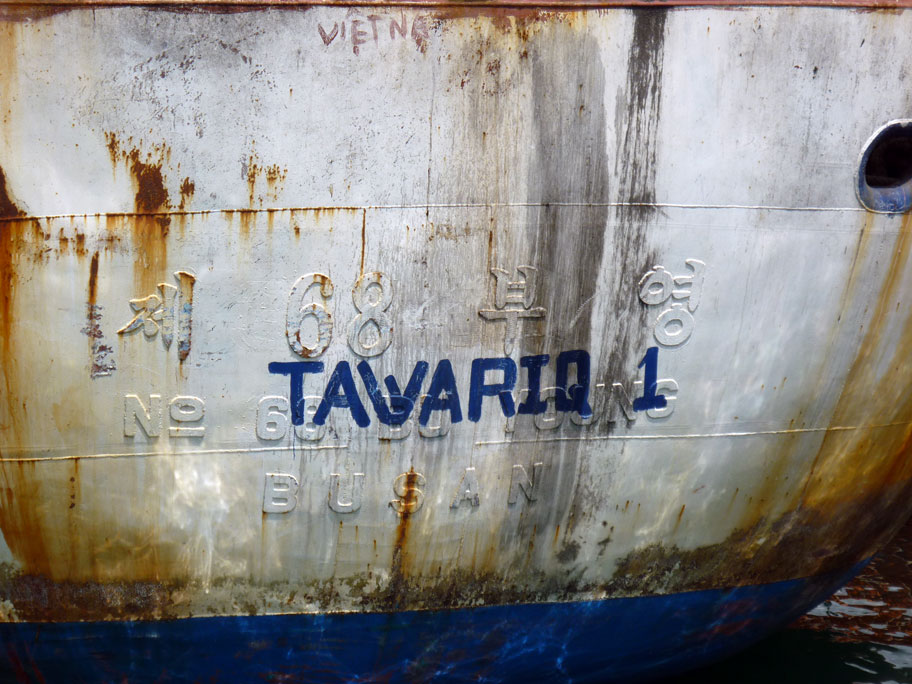GUILTY: The verdict given to the TAWARIQ 1 by the High Court of the United Republic of Tanzania
On the 23rd of February 2012, almost three years since its arrest, the High Court of the United Republic of Tanzania delivered its verdict in the case of the fishing vessel TAWARIQ 1; guilty. The Court ordered the vessel to be forfeited to the Government. The Captain of the fishing vessel, Mr. Hsu Chin Tai and the ship’s agent Mr. Zhao Hanquing were found guilty of fishing without a licence in the Tanzanian Exclusive Economic Zone (EEZ). They have been sentenced to pay 1 billion Tanzanian shillings each (USD 625,975) or go to jail for twenty years. The Captain was also fined a further of 20 billion Tanzanian shillings (USD 12,519,500) for the offence of pollution.
On the 8th of March 2009, the TAWARIQ 1, supposedly registered to Oman, was intercepted 180 nautical miles off the Tanzanian coast, and subsequently arrested by a South African Environmental Protection vessel EPV Sarah Baartman. The vessel had no flag visible or hoisted, the radar was switched off, no license or permit was produced and no port of registry was provided. Multiple names were found on the vessel. The name No.68 Bu Young was found embossed on the port and starboard bows as well as on the stern of the vessel and at the upper part of the wheel house. The name Tawariq was painted over the name Buyoung in several places on the hull. Life-rings, the service record of one of the life-rafts and other documents indicated the name of a Korean fishing vessel, namely No.11 Insung. The vessel that uses long-lines, was caught with more than 200 tonnes of fresh and frozen tuna on board.
The captain of the vessel produced an expired license for another vessel (TAWARIQ II) when he was inspected the day following the arrest. Later, documents onboard identified the vessel as the No. 68 Bu Young of South Korea. A third set of documents identified the vessel as the In Sung, also of Korea. If the vessel is TAWARIQ I, then the vessel is the previous Odine Malagasy registered in Madagascar, though even today, no current registration has been produced by the agent or the captain.
On the day of the arrest of TAWARIQ 1, there were four other large fishing vessels detected by the fisheries patrol vessel fishing also fishing illegally in the Tanzanian EEZ. It is assumed that they were tipped-off by the TAWARIQ 1 as they all managed to escape. They were TAWARIQ 2, 3 and 4.
The story of the TAWARIQ 1 is yet further evidence of a change occurring across the African continent. It is evidence that developing countries are no longer prepared to have their fishery resources stolen and the environment degraded ‚it is evidence that regional and international commitments that are being made ‚are being implemented. In July 2008, Stop Illegal Fishing (SIF) supported the Southern African Development Community (SADC) in the elaboration of the SADC Statement of Commitment on IUU fishing, a statement that built on the SADC Protocol on Fisheries. Based on these political commitments a four nation regional patrol, between South Africa, Tanzania, Mozambique and Kenya took place and it saw the arrest of several IUU vessels operating in the South-Eastern waters of Africa, amongst them was the TAWARIQ 1.
The positive outcome from this arrest is a result of a successful cooperation between the governments of Norway, USA and Mozambique who support Tanzania by providing vital knowledge to the Court procedures, and highlighting the importance of international cooperation and information sharing in combating IUU fishing. Industrial fisheries crime cases are generally both complex and expensive, underlining the need for support from international partners in pursuing such cases.
SIF has supported the TAWARIQ 1 process from the arrest of the vessel until today when the final verdict has been delivered. Having learned valuable lessons from the successful prosecution of the Antillas Reefer arrested in Mozambique in August 2010 as well as in this latest case of TAWARIQ 1, we hope that many more African countries will be able to apply these lessons to achieve their own successful prosecutions. SIF sees this verdict as an extremely important step towards deterring IUU fishing in African EEZs, and congratulates the United Republic of Tanzania for the successful conclusion of this case.
Photo by Peter Flewwelling, NFDS

Recent Posts
In the Seychelles, transparency and regional cooperation as key drivers of sustainable fisheries
On 21-24 January 2025, MCS agents from the Seychelles Fisheries Authority (SFA) benefited...
Zimbabwe has become the 13th country to sign the MCSCC Charter.
On the 21 November 2024, The Republic of Zimbabwe became the thirteenth signatory...
Ghana adopts high-standard procedures for PSMA implementation – leading the way for the FCWC region
On 06-08 November, SIF was in Tema, Ghana to continue the process of...